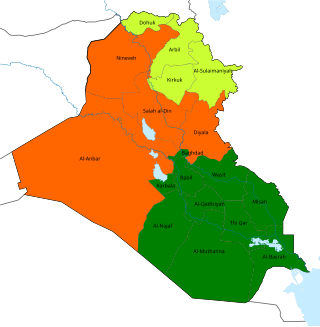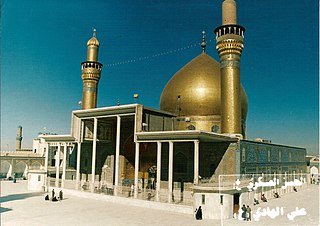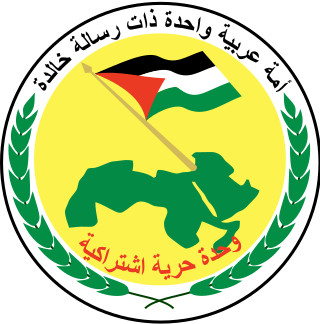Related Research Articles

Tariq Aziz was an Iraqi politician who served as Deputy Prime Minister (1979–2003), Minister of Foreign Affairs (1983–1991) and a close advisor of President Saddam Hussein. Their association began in the 1950s when both were activists for the then-banned Arab Socialist Ba'ath Party. He was both an Arab nationalist and a member of the Chaldean Catholic Church.

The occupation of Iraq (2003–2011) began on 20 March 2003, when the United States invaded with a military coalition to overthrow Iraqi president Saddam Hussein and his Arab Socialist Ba'ath Party, and continued until 18 December 2011, when the final batch of American troops left the country. While the United States, the United Kingdom, and Australia were the largest contributors to the coalition, 29 other countries, such as Japan, were involved in the Iraq War in a lesser capacity. Additionally, several private military contractors took part in enforcing the occupation.

Ibrahim Abdul Karim al-Eshaiker, better known as Ibrahim al-Jaafari, is an Iraqi politician who was Prime Minister of Iraq in the Iraqi Transitional Government from 2005 to 2006, following the January 2005 election. He served as Minister of Foreign Affairs from 2014 to 2018.

The Islamic Dawa Party, is an Iraqi Shia Islamist political movement that was formed in 1957 by seminarians in Najaf, Iraq, and later formed branches in Lebanon and Kuwait. The Party backed the Iranian Revolution and also Ayatollah Ruhollah Khomeini during the Iran–Iraq War. It supported the invasion of Iraq. Iran played a crucial role in the development of the movement, especially its Lebanese branch which later became Hezbollah. In 2019, the Dawa Party was reportedly suffering from internal divisions and is in danger of losing its "political relevance". The Islamic Dawa Party is led by Nouri Al-Maliki.

An Iraqi insurgency began shortly after the 2003 American invasion deposed longtime leader Saddam Hussein. It is considered to have lasted until the end of the Iraq War and U.S. withdrawal in 2011. It was followed by a renewed insurgency.

The National Iraqi Alliance, also known as the Watani List, is an Iraqi electoral coalition that contested the 2010 Iraqi legislative election. The Alliance is mainly composed of Shi'a Islamist parties. The alliance was created by the Supreme Council for Islamic Revolution in Iraq to contest in the January 2005 and December 2005 under the name United Iraqi Alliance, when it included all Iraq's major Shi'a parties. The United Iraqi Alliance won both those of elections however later fell apart after several major parties left the alliance due to disputes with Prime Minister Nouri al-Maliki and the Supreme Council.

The Council of Representatives is the unicameral legislature of the Republic of Iraq. According to the Constitution of Iraq, it is the lower house of the bicameral legislature of the country. As of 2020, it comprises 329 seats and meets in Baghdad inside the Green Zone.

Parliamentary elections were held in Iraq on 15 December 2005, following the approval of a new constitution in a referendum on 15 October.
The first government of Iraq led by Prime Minister Nouri al-Maliki took office on May 20, 2006 following approval by the members of the Iraqi National Assembly. This followed the general election in December 2005. The government succeeded the Iraqi Transitional Government which had continued in office in a caretaker capacity until the new government was formed and confirmed.

At approximately 6:44 a.m. Arabia Standard Time on 22 February 2006, al-Askari Shrine in Samarra, Iraq, was severely damaged in a bombing attack amidst the then-ongoing Iraq War. Constructed in the 10th century, it is one of the holiest sites in Shia Islam. Despite the magnitude of the explosions, there were no casualties. American president George W. Bush asserted that the bombing had been carried out by Al-Qaeda in Iraq, which denied involvement in the attack.
The following lists events that happened during 2006 in Iraq.

Nouri Kamil Muhammad-Hasan al-Maliki, also known as Jawad al-Maliki, is an Iraqi politician and leader of the Islamic Dawa Party since 2007. He served as the Prime Minister of Iraq from 2006 to 2014 and as Vice President from 2014 to 2015 and again from 2016 to 2018.

The Iraq War, also referred to as the Second Gulf War, was a prolonged conflict in Iraq lasting from 2003 to 2011. It began with the invasion by a United States-led coalition, which resulted in the overthrow of the Ba'athist government of Saddam Hussein. The conflict persisted as an insurgency arose against coalition forces and the newly established Iraqi government. US forces were officially withdrawn in 2011. In 2014, the US became re-engaged in Iraq, leading a new coalition under Combined Joint Task Force – Operation Inherent Resolve, as the conflict evolved into the ongoing insurgency.
Abd al-Rahim Ahmad Ali al-Hasini is an Iraqi politician and secretary-general of the Shia Islamist Islamic Virtue Party, which is based in Basra.
The National Party was a Syrian political party founded in 1947, eventually dissolving in 1963, after the Syrian Ba'ath Party established one-party rule in Syria in a coup d'état. It grew out of the National Bloc, which opposed the Ottomans in Syria, and later demanded independence from the French mandate. The party saw the greatest support among the Damascene old guard and industrialists. It supported closer ties with the Arab countries and territories to Syria's south, mainly Saudi Arabia, Egypt, Lebanon, and Mandatory Palestine, although it began supporting Hashemite-ruled Iraq and Jordan starting in 1949 amongst growing public support. While the dominant party in 1940s and early 1950s, it was replaced by its rival, the People's Party, thereafter. Similar to the People's Party, the National Party was also supported by landowners and landlords.

The National Reform Trend, also known as the National Reform Movement or as Islah, is an Iraqi political party that was founded in 2008 by former Iraqi prime minister, Ibrahim al-Jaafari. It is a Shiite-Islamic-based party.
Nadeem/Nadim/Nadiem/Nedim is an Arabic masculine given name. It means "best friend of the drinker", "companion", "confidant" or "friend".

The Arab Socialist Ba'ath Party, also referred to as the pro-Syrian Ba'ath movement, is a neo-Ba'athist political party with branches across the Arab world. The party emerged from a split in the Ba'ath Party in February 1966 and leads the government in Syria. From 1970 until 2000, the party was led by the Syrian president and Secretary General Hafez al-Assad. Until October 2018, leadership has been shared between his son Bashar al-Assad and Abdullah al-Ahmar. In 2017, after the reunification of the National and Regional Command, Bashar al-Assad became the Secretary General of the Central Command. The Syrian branch of the Party is the largest organisation within the Syrian-led Ba'ath Party.
This article concerns the formation process of the Al Maliki I Government of Iraq in the aftermath of the Iraq National Assembly being elected on December 15, 2005. Due to disputes over alleged vote-rigging the results of the election were only certified by the Independent Electoral Commission of Iraq on February 10, 2006.

Jamal Ja'far Muhammad Ali Al Ibrahim, better known by his kunyaAbu Mahdi al-Muhandis, was an Iraqi paramilitary leader and former commander of the Popular Mobilization Forces (PMF). At the time of his death, he was deputy chief of the PMF and regarded as one of Iraq's most powerful men.
References
- ↑ "Jaafari's insistence on his candidacy reflects a dictatorial attitude". Mideastwire.com. 15 March 2006. Archived from the original on 14 July 2011. Retrieved 17 December 2010.
- ↑ "Iraqi Shi'i party leader said dismissed over opposing Al-Ja'fari". Iraq Updates Limited. 5 April 2006. Archived from the original on 15 March 2012. Retrieved 17 December 2010.
- ↑ "An Iraqi Parliamentarian Considers 'The Surge'". Electronic Iraq. 18 January 2007. Archived from the original on 12 June 2007. Retrieved 17 December 2010.